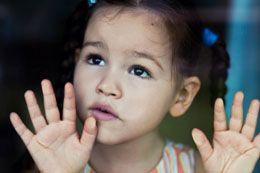
Yet, I don’t know if someone can imagine what is there in an orphan’s soul, a child who has always wanted to know his own family, to spend at least a day with his loved ones. How happy must a child be when his mother hugs him, when he comes back from school and lays his head in his mother lap forgetting all problems…but will I ever experience that feeling?
Why is that some parents leave their children in an orphanage? Why do they just forsake us here and mind their own lives on separate ways? I wonder, will our ways cross some day; if so, what they will say?
To be an orphan is not something to be ashamed of, it is just a misfortune that some of us have. It is the fact that our way in life is sprinkled with more obstacles, but we have to be optimistic and believe that the sun will shine bright for us as well, and somewhere, sometime, a family will open their arms for us.”
There is a huge difference between knowing the meaning of the word ‘orphan’ and being in that position every single moment of your life. You might as well ask: “A lifetime of being an orphan, isn’t that pushed a bit too far? I mean, even if you have parents, you will eventually lose them sooner or later!”
All of us agree that growing children need strong, interactive relationships with responsible adults. Besides giving emotional and physical security, such ties help the child grow and learn to cope with an ever-changing world. And these requirements are fulfilled by the parents.
Psychological Development in Orphans and Other Children
These comparisons might be made with general population norms, selected foster children, or children raised by relatives. When groups of children with orphanage experience were compared with other children, the average development in orphans was found to be lower on measures of general intelligence, personality, language, or social skills. Though the individual scores varied widely within different groups, the overall trend was negative for orphaned subjects. It was reported that intelligence and related cognitive skills suffered from orphanage experience.
However, one of the most substantial studies (Trotzkey, 1930) to discount this claim is seldom mentioned, perhaps because it was published privately. It compared orphanage and foster care children in Jewish-sponsored programs in Chicago, New York, and Cleveland, with public school children. Over 3,700 Jewish care children were involved, which included 2,523 from orphanages and 1,214 from foster homes. Data on IQ scores, derived using either group tests or the individually administered Stanford-Binet, showed the Chicago orphanage samples scored in the average range, the same as children in New York City elementary schools.
Nowadays Orphans – Workaholics’ Children
Nowadays, we indeed meet orphans that are part of another category, the workaholics’ children. Even if they have both parents very much alive, their mom and dad have their own careers that need almost all of their time and by the time they come home, they are exhausted and moments spent with their children are dramatically reduced.
Even if they might be physically present, their minds are still focused on the next target at work. Profession and business almost always manage to get priority, although they love their children very much! Of course, they do this for the best reason: to offer their kids a better future and all what they could possibly want.
However, for children, material needs are not that important. They crave for your love and attention, they want your time, they need you! Children silently suffer and by the time you as a parent realize what is going on, it might be late, if not too late!
Being an orphan is not easy but also, this is a special category of people whom God shows special favor; God’s children are not orphans!
“Let the little children come to me, and do not hinder them, for the kingdom of heaven belongs to such as these.” (Luke 18:16)

